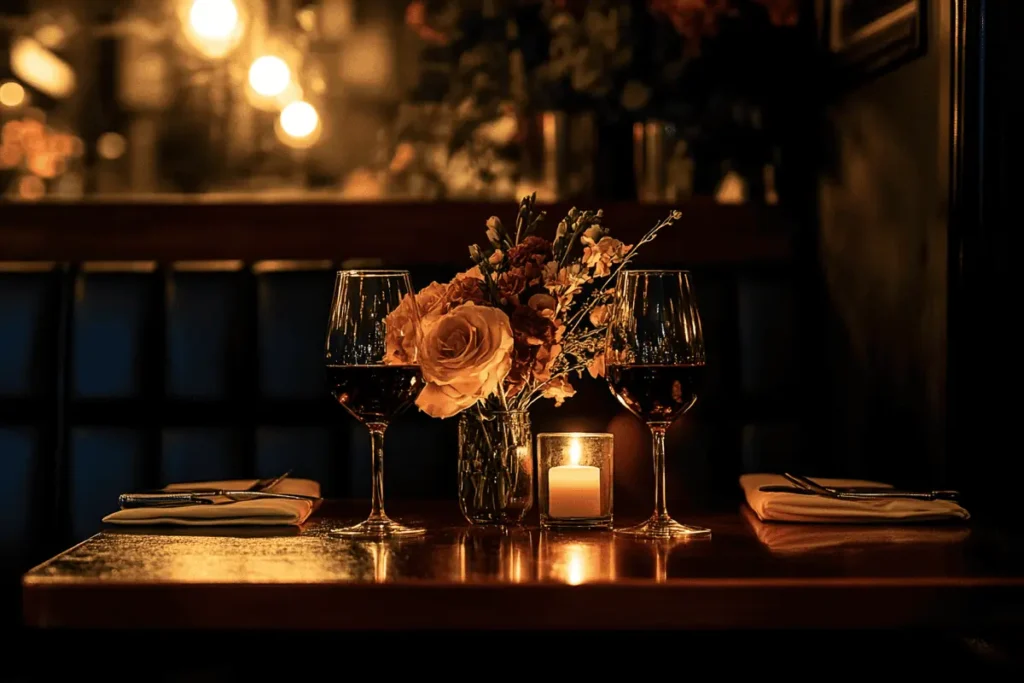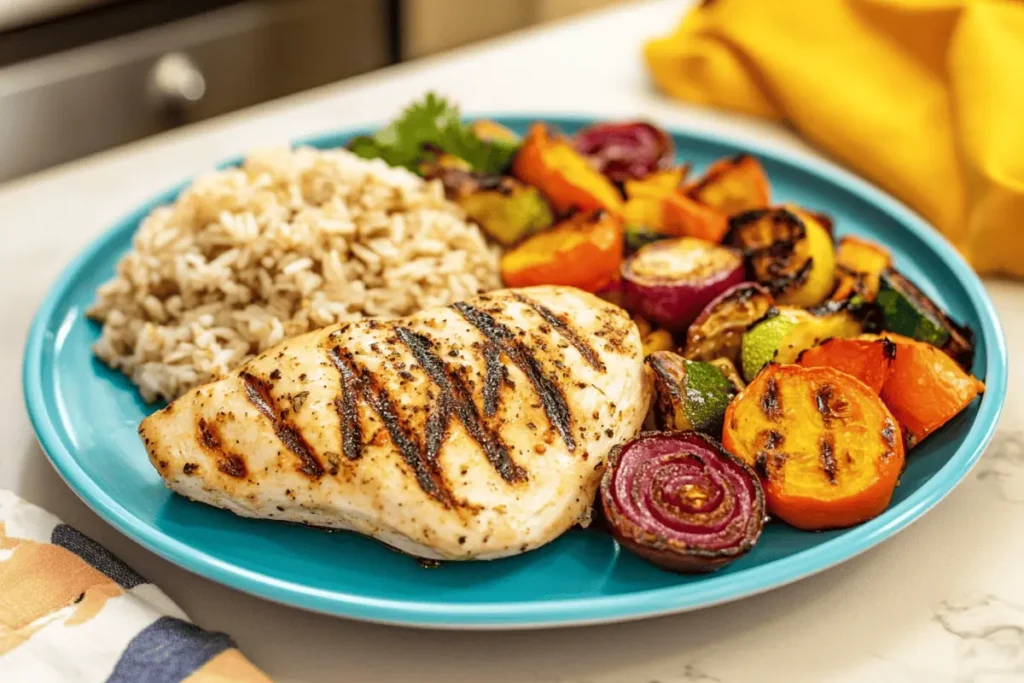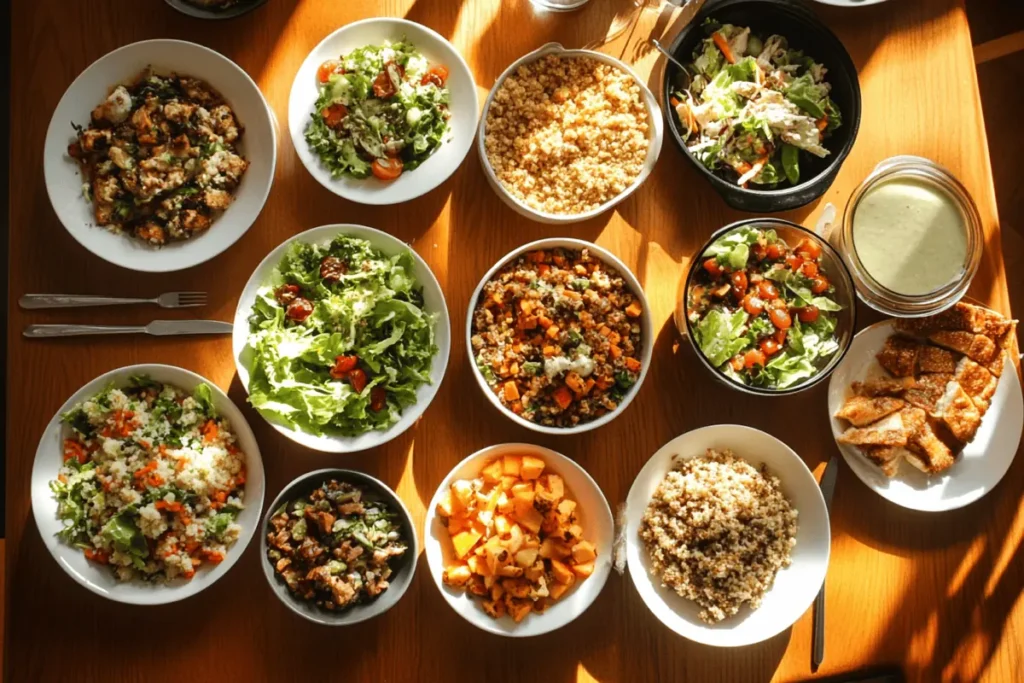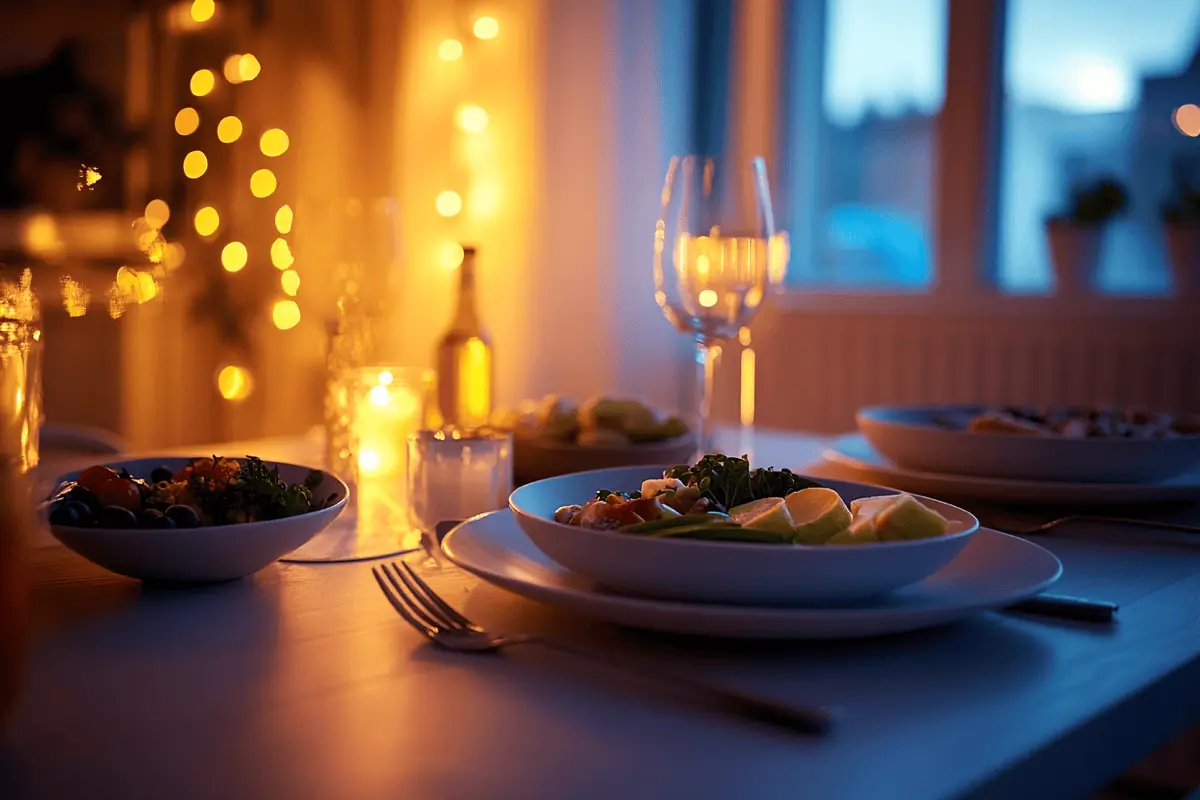Is 8 PM Too Late for Dinner? Many people wonder. Late meals and their impact on metabolism, health, and sleep often spark debate. Some believe eating late interferes with weight goals or causes restless sleep, while others raise social concerns about the “right” time to dine. This article explores the “eating after 8 PM myth” and cultural, lifestyle, and personal variations in dinner schedules.
You’ll learn how late dinners may affect digestion, metabolism, and whether dining at 8 PM, 9 PM, or later truly matters. We’ll also discuss strategies to adjust your meal timing, supported by research and cultural insights. By the end, you’ll have tools to decide the best dinner routine for your lifestyle.
Table of contents
Evolution of Dinner Times in Different Cultures
Dinner times vary around the globe. In many parts of Europe, dining well after 8 PM is common. In Spain, for instance, eating dinner at 9pm or later is normal. Some even enjoy dinner at 10 PM. On the other hand, in the U.S., an earlier dinner between 5 PM and 7 PM is more typical. Still, modern work schedules and social events can shift mealtimes. Many people work late, commute long distances, or join friends after an evening class. In such cases, 8 PM might be the earliest chance to sit down for a meal.
Moreover, cultural habits influence what we believe is standard. Some families prefer a bigger lunch and a lighter, later dinner. Others do the opposite. Hence, what is late in one place might be standard in another. Realizing these differences helps us understand why someone might think “8 PM is late for dinner” while another sees it as completely normal. Also, in large cities, restaurants often stay open later, making 8 PM to 10 PM reservations common. In more rural areas, kitchens might close early. These differences show that there is no universal rule about dinnertime.
Even so, you might ask, “But what about health?” or “What time should I eat dinner to stay fit?” Cultures that dine late, such as in the Mediterranean region, often have long, relaxed meals that include fresh ingredients. Meanwhile, in other places, large dinners might be replaced by a heavy lunch. It is possible that the total diet, along with daily lifestyle, matters more than the specific hour you eat. Let us now see how mealtime affects digestion and metabolism.
The Role of Metabolism and Eating After 8 PM
Eating after 8 PM is often questioned for its effects on metabolism, with rumors suggesting weight gain, slower metabolism, or poor sleep. However, scientific findings are mixed. While some studies link eating right before bed to weight gain, others emphasize that total calorie intake and food quality matter more. The circadian rhythm, your body’s internal clock, can influence how nutrients are processed, prompting experts to advise against heavy meals before bedtime.
That said, eating at 8 PM isn’t inherently harmful. Many maintain a healthy weight by focusing on portion control and balanced meals. Evening workouts may even necessitate refueling at that time. For shift workers or those with unconventional schedules, late eating can align with their wellness goals when planned thoughtfully.
Practical habits matter more than timing—do you overeat or choose unhealthy options when eating late? These behaviors impact weight and energy levels more than the clock. Prioritizing consistent mealtimes, balanced nutrients, and moderation often outweighs strict concerns about eating at a specific hour.
Exploring the Eating After 8 PM Myth
The phrase “eating after 8pm myth” is popular because many people believe that any meal past 8 PM is a direct path to weight gain. Yet, that stance can be overly simplistic. Metabolism does slow down during sleep, but it does not simply turn off. Your body continues burning calories at a resting rate. Therefore, if your total daily calorie intake is appropriate, having dinner at 8 PM does not necessarily lead to extra pounds.
In addition, age, activity level, and bedtime habits can influence how late is too late to eat dinner. For instance, an older adult who goes to bed at 9:30 PM might feel unwell if they eat at 8:45 PM. On the other hand, a young person who stays up until midnight may find 8 PM perfectly normal. Also, the content of the meal matters. A large serving of heavy, fried foods right before bedtime can cause discomfort. A smaller, balanced meal with lean protein, vegetables, and whole grains may cause fewer issues.
Overall, the “eating after 8pm myth” does not hold true for everyone. The best approach is to observe how your body reacts. If you experience acid reflux or disturbed sleep after a late dinner, you might need to adjust your mealtime. Otherwise, you can safely eat at 8 PM without worrying that it is inherently bad. Next, we will see how social events, like dinner dates or dinner parties, can factor into your mealtime decisions.
Is 8 PM Too Late for a Dinner Date?
You might wonder, “Is 9pm too late for dinner date?” or “How late is too late for dinner date?” In many scenarios, the desired dinner hour depends on cultural norms or your personal preference. If you are attending an evening show or you both get off work at 7 PM, you might only be able to start dinner around 8 PM. In fact, many metropolitan restaurants thrive on seatings at 8 PM or 9 PM for dinner. So, if you want a romantic evening, you can comfortably choose an 8 PM reservation.
Nevertheless, if you or your date wake up very early, an 8 PM meal might feel late for dinner. In that case, you can plan a dinner date earlier, or simply keep the evening light with small plates or shared appetizers. The main point is to consider your schedule, the dining environment, and how you want to feel afterward. Some people love the relaxed vibe of a later dinner, especially if they plan to enjoy dessert or chat for a while. Others prefer an early meal, so they can get to bed without a full stomach.
Moreover, conversation around “Is 9pm too late for dinner date?” might also involve personal health concerns. If one person has digestion issues or needs to follow a strict schedule, 9 PM might be uncomfortable. Good communication is key. You can always meet in the middle by starting cocktails or coffee at 7 PM and ordering dinner at 8 PM. That way, no one feels rushed, and you can enjoy each other’s company. Next, let us look at how to decide what time is too late to eat dinner based on your day-to-day life.

What Time Is Too Late to Eat Dinner?
People often wonder, “What time is too late to eat dinner?” The answer can depend on your bedtime and how your digestive system reacts to food. If you typically sleep at 11 PM, having dinner at 10:30 PM might not give you enough time to digest. You could feel bloated or restless while trying to fall asleep. But if your schedule keeps you awake until 1 AM, an 8 PM or 9 PM dinner might actually be mid-evening for you.
It also helps to note that some individuals experience heartburn or acid reflux if they lie down too soon after eating. Experts often recommend waiting at least two to three hours before going to bed. That suggests if you normally sleep at 10:30 PM, finishing dinner by 8:30 PM or 9 PM might be ideal. However, if you are not prone to digestive issues, you may be fine pushing dinner a bit later.
Lifestyle is a major factor. Athletes, shift workers, and those who exercise in the evenings might find that later dinners are more practical. Meanwhile, parents with young children often eat earlier, to match family routines. The real measure is whether you feel comfortable, sleep well, and maintain a healthy routine. If you do, then 8 PM may not be too late for dinner at all.
Eating Dinner at 9 PM or 9:30 PM: Is It Ever Too Late?
Sometimes you might see online discussions like “Eating dinner at 9pm Reddit” or “Eating dinner at 9 30.” These posts show that many people dine at these hours for various reasons. Some people in big cities do not get home until after 8 PM. Others prefer working out or attending social events first and then enjoying a meal later. Despite the idea that 9 PM or 9:30 PM is late, these times can still be fine for dinner, depending on your schedule.
Still, if you are interested in weight management, sleeping patterns, or general well-being, you may want to consider spacing out your meals. For instance, if you eat breakfast at 7 AM, then lunch at noon, and do not get dinner until 9:30 PM, you might experience a long gap. That can lead to extreme hunger and possible overeating when you finally sit down to eat. A simple solution is to include a late-afternoon snack or a mini-meal around 4 PM or 5 PM. This way, you will not feel ravenous at dinnertime.
Moreover, a late dinner might coincide with social activities. If that is the case, enjoy your meal in moderation. Choose a balanced plate with protein, vegetables, and complex carbohydrates. Limit heavy sauces and fried items if they cause discomfort. Also, try to stay hydrated. Drinking water during and after dinner helps digestion. By using these tips, eating dinner at 9 PM or even 9:30 PM can fit well into your life.
Eating After 8 PM: Myth or Reality for Weight Gain?
Does eating after 8 PM late dinner automatically cause weight gain? Many experts say that it is not the time but the total calorie balance that matters most. If you eat more calories than you burn in a day, weight gain can occur, whether you eat at 6 PM or 10 PM. Yet, some people notice that they overeat more at night. Late-night snacking on calorie-dense foods can add up quickly. If you regularly skip dinner and then eat junk foods at midnight, that habit can hinder weight management.
In contrast, if you plan a nutritious, portion-controlled dinner at 8 PM, you can maintain a balanced diet. A hearty salad with grilled chicken or fish, a serving of brown rice or quinoa, and cooked vegetables might be more filling and healthier than skipping dinner and then raiding the snack cupboard. Timing can play a role in how your body digests food, but it is only one factor among many.

Furthermore, individuals differ in how they respond to late meals. Some feel sluggish if they eat a huge meal right before bed. Others do not notice a difference. Pay attention to how you feel. That self-awareness can guide you better than any hard rule about 8 PM. If you find that late meals affect your sleep or energy levels, try shifting dinner earlier or adjusting portion sizes. Next, let us talk about the question “What time should I eat dinner?” in a more direct way.
What Time Should I Eat Dinner?
Many people wonder, “What time should I eat dinner?” The answer depends on factors like:
- Your Work Schedule: If you leave work at 7 PM, you might not be able to start dinner until 8 PM.
- Family Routine: If you have young kids, you might need to eat earlier.
- Fitness Goals: If you train in the evening, you might do better with a later meal for recovery.
- Sleep Cycle: If you go to bed at 10 PM, an earlier dinner might help with digestion.
Generally, it is good to leave two or three hours between dinner and bedtime. That buffer helps your body digest. It can reduce issues like heartburn or poor sleep. If you aim for an 11 PM bedtime, finishing dinner around 8 or 9 PM can work well. However, if you are on a shift schedule or simply prefer to stay up late, you can shift these times accordingly.
Another point to consider is whether you follow any specific eating pattern, like intermittent fasting. If you are on a 16:8 fasting schedule, you may have a different cutoff time for your last meal. Still, many find that an 8 PM dinner is perfectly acceptable, as long as it fits within their eating window. Because everyone’s lifestyle is unique, experiment to see which schedule helps you feel your best. Now, let’s cover some quick tips for eating late dinners in a healthy way.
Tips for Eating Late Dinners in a Healthy Way
- Plan Ahead: If you know dinner will be late, include a small snack in the late afternoon. You might choose a piece of fruit, yogurt, or a handful of nuts to curb extreme hunger.
- Choose Balanced Meals: Focus on lean proteins (chicken, fish, tofu), complex carbs (brown rice, quinoa, whole-grain pasta), and plenty of vegetables. This helps you feel satisfied without going overboard.
- Watch Portion Sizes: Even if dinner is late, big servings can make you feel uncomfortable at bedtime. Control your portions and eat slowly.
- Avoid Heavy, Spicy Foods: If you are prone to heartburn, limit spicy and greasy meals. These can trigger reflux, especially close to bedtime.
- Stay Hydrated: Drink water during dinner. But avoid guzzling large amounts of fluids right before bed to minimize nighttime bathroom trips.
- Leave Time Before Bed: Aim to finish eating at least two hours before you plan to sleep. That timeframe lets your body start digestion.
By following these tips, you can have a late dinner without major drawbacks. Next, we will address a few more points related to “eating after 8pm what it does to your metabolism” and how to handle social events.

Late Dinner Parties and Social Events
Social gatherings often take place in the evening. You might ask, “Is 8pm too late for dinner party?” That depends on your guests. Some people enjoy a fashionable late start, with cocktails at 7 PM and dinner at 8 or 9 PM. Others may have kids or early commitments the next morning, so they might prefer a 6 PM start. If you are hosting, it can help to communicate the approximate mealtime to your guests ahead of time. That way, everyone can plan their day and appetite accordingly.
Moreover, if you or your guests worry about eating late, you can serve lighter courses. A salad course or soup can open the meal. Then, a modest main dish can follow. You can keep dessert light or optional. Providing comfortable seating and a relaxed atmosphere can also make a late dinner feel less rushed. Overall, courtesy and consideration go a long way. By acknowledging your group’s preferences, you can ensure a pleasant experience. Now, let us see how you might navigate dinner times if you are focusing on weight management or if you have special health needs.
Managing Weight and Health Goals with Late Dinners
Many people trying to lose weight ask if late dinners will sabotage their efforts. But the truth is more nuanced. If your total calorie intake is within a healthy range, a late dinner will not necessarily lead to weight gain. Meanwhile, if you tend to eat mindlessly at night or overindulge in high-calorie snacks, that can negatively affect your goals. Planning your meals and snacks can help.
Furthermore, do not forget how healthy habits throughout the day matter. Regular exercise, balanced meals, and enough sleep all contribute to better health. If you dine at 8 PM, focus on making that meal nutritious and not too large. Then, wind down with a relaxing routine instead of diving into more snacks. By adopting these habits, you can manage your weight and health while still eating dinner at a time that suits your life.
Conclusion
So, is 8 PM too late for dinner? The answer depends on your lifestyle, health needs, and cultural context. Many people find 8 PM to be a natural mealtime, especially if they work or attend events in the early evening. Meanwhile, if you typically sleep at 10 PM, you might need to adjust for digestion. Some consider 8 PM to be prime dinner hour, while others enjoy an even later meal. Ultimately, the right dinner time hinges on when you wake up, your work schedule, and how your body reacts to food.
You should note that the belief that eating after 8 PM always causes weight gain is a myth. It is more about what and how much you eat, along with when you go to bed. If you find that a late dinner gives you heartburn or restless nights, you can shift your meal earlier or reduce your portion size. However, if 8 PM fits your routine and you feel good, there is no reason to worry.
The best approach is to listen to your body, maintain a healthy diet, and leave enough time between dinner and bedtime for proper digestion. By following these steps, you can enjoy dinner at 8 PM—or whatever time suits you—while still meeting your health, social, and personal goals.
Frequently Asked Questions
Is it okay to eat dinner at 8 pm?
Yes, it can be okay. Many people eat around 8 pm due to work or personal routines. Try to keep portions moderate and choose balanced meals.
Is 8pm too late for dinner party?
It depends on your guests’ preferences. Some cultures and social circles dine later. It can be fine if everyone agrees on the schedule.
Why should you not eat after 8pm?
Some say that eating late can disrupt sleep or lead to weight gain. However, it is more about overall calorie intake and timing before bedtime.
Is 8:30pm too late for dinner?
8:30 pm might be late if you go to bed early. But if you sleep later, it can be a normal time. Leaving a two-hour gap before sleep is often recommended.

